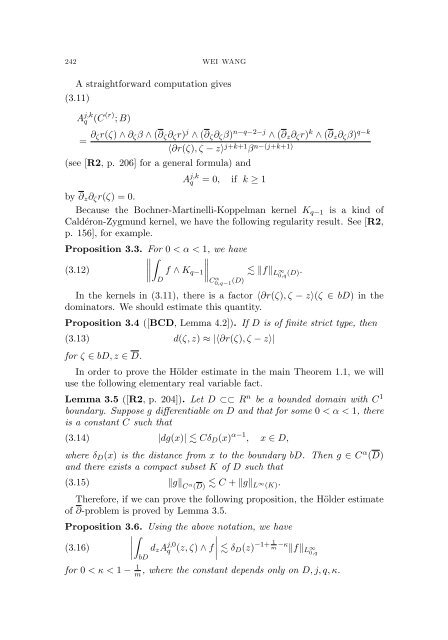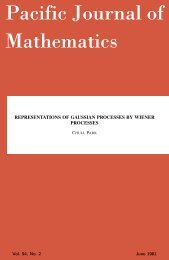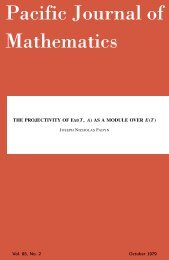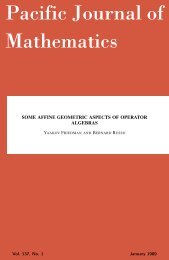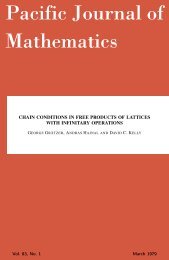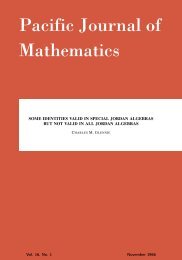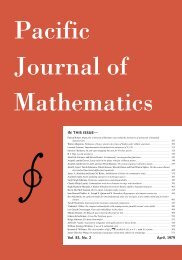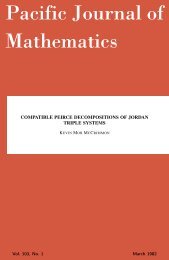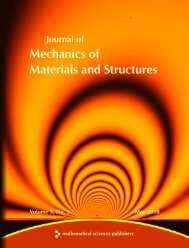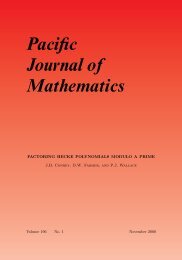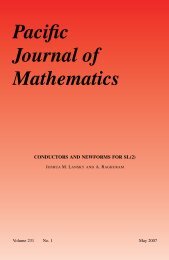- Page 1 and 2:
Pacific Journal of Mathematics Volu
- Page 3 and 4:
PACIFIC JOURNAL OF MATHEMATICS Vol.
- Page 5 and 6:
EIGENVALUES ASYMPTOTICS 3 (i) If pm
- Page 7 and 8:
EIGENVALUES ASYMPTOTICS 5 Corollary
- Page 9 and 10:
Thus, by the Itô formula, we have
- Page 11 and 12:
Therefore, K1(t) ≡ t 2−d/2 ≤
- Page 13 and 14:
EIGENVALUES ASYMPTOTICS 11 The chan
- Page 15 and 16:
EIGENVALUES ASYMPTOTICS 13 Here Res
- Page 17 and 18:
PACIFIC JOURNAL OF MATHEMATICS Vol.
- Page 19 and 20:
IMAGINARY QUADRATIC FIELDS 17 Table
- Page 21 and 22:
IMAGINARY QUADRATIC FIELDS 19 and t
- Page 23 and 24:
IMAGINARY QUADRATIC FIELDS 21 Propo
- Page 25 and 26:
〈σ 〈σ〉 〈σ, τ〉 2 〈1
- Page 27 and 28:
IMAGINARY QUADRATIC FIELDS 25 Then
- Page 29 and 30:
IMAGINARY QUADRATIC FIELDS 27 were
- Page 31 and 32:
IMAGINARY QUADRATIC FIELDS 29 Thus
- Page 33:
IMAGINARY QUADRATIC FIELDS 31 [3] ,
- Page 36 and 37:
34 CARINA BOYALLIAN spherical serie
- Page 38 and 39:
36 CARINA BOYALLIAN Here I G MAN (
- Page 40 and 41:
38 CARINA BOYALLIAN where k ≤ [ n
- Page 42 and 43:
40 CARINA BOYALLIAN The case G = Sp
- Page 44 and 45:
42 CARINA BOYALLIAN we can, since i
- Page 46 and 47:
44 CARINA BOYALLIAN and this formul
- Page 48 and 49:
46 CARINA BOYALLIAN Here, J(ν) int
- Page 50 and 51:
48 CARINA BOYALLIAN [V] D. Vogan, R
- Page 52 and 53:
50 ROBERT F. BROWN AND HELGA SCHIRM
- Page 54 and 55:
52 ROBERT F. BROWN AND HELGA SCHIRM
- Page 56 and 57:
54 ROBERT F. BROWN AND HELGA SCHIRM
- Page 58 and 59:
56 ROBERT F. BROWN AND HELGA SCHIRM
- Page 60 and 61:
58 ROBERT F. BROWN AND HELGA SCHIRM
- Page 62 and 63:
60 ROBERT F. BROWN AND HELGA SCHIRM
- Page 64 and 65:
62 ROBERT F. BROWN AND HELGA SCHIRM
- Page 66 and 67:
64 ROBERT F. BROWN AND HELGA SCHIRM
- Page 68 and 69:
66 ROBERT F. BROWN AND HELGA SCHIRM
- Page 70 and 71:
68 ROBERT F. BROWN AND HELGA SCHIRM
- Page 72 and 73:
70 ROBERT F. BROWN AND HELGA SCHIRM
- Page 74 and 75:
72 ROBERT F. BROWN AND HELGA SCHIRM
- Page 76 and 77:
74 ROBERT F. BROWN AND HELGA SCHIRM
- Page 78 and 79:
76 ROBERT F. BROWN AND HELGA SCHIRM
- Page 80 and 81:
78 ROBERT F. BROWN AND HELGA SCHIRM
- Page 82 and 83:
80 ROBERT F. BROWN AND HELGA SCHIRM
- Page 84 and 85:
82 GILLES CARRON à l’infini s’
- Page 86 and 87:
84 GILLES CARRON isométriques au d
- Page 88 and 89:
86 GILLES CARRON Comme D est ellipt
- Page 90 and 91:
88 GILLES CARRON Réciproquement si
- Page 92 and 93:
90 GILLES CARRON où H est la proje
- Page 94 and 95:
92 GILLES CARRON 2.a. Exemples repo
- Page 96 and 97:
94 GILLES CARRON alors si σ ∈ C
- Page 98 and 99:
96 GILLES CARRON Ainsi s’il exist
- Page 100 and 101:
98 GILLES CARRON Proposition 2.7. N
- Page 102 and 103:
100 GILLES CARRON l’espace des 1
- Page 104 and 105:
102 GILLES CARRON compact. De même
- Page 106 and 107:
104 GILLES CARRON 4. Application du
- Page 108 and 109:
106 GILLES CARRON Dans le cas où l
- Page 111 and 112:
PACIFIC JOURNAL OF MATHEMATICS Vol.
- Page 113 and 114:
BRAIDED OPERATOR COMMUTATORS 111 Re
- Page 115 and 116:
BRAIDED OPERATOR COMMUTATORS 113 Re
- Page 117 and 118:
BRAIDED OPERATOR COMMUTATORS 115 3.
- Page 119 and 120:
Then, for 1 < k ≤ m + 1, we have
- Page 121 and 122:
BRAIDED OPERATOR COMMUTATORS 119 Mo
- Page 123 and 124:
BRAIDED OPERATOR COMMUTATORS 121 It
- Page 125:
E-mail address: prosk@imath.kiev.ua
- Page 128 and 129:
124 DANIEL J. MADDEN times. Further
- Page 130 and 131:
126 DANIEL J. MADDEN Further, s t
- Page 132 and 133:
128 DANIEL J. MADDEN Now the whole
- Page 134 and 135:
130 DANIEL J. MADDEN and β = 1 −
- Page 136 and 137:
132 DANIEL J. MADDEN We can simplif
- Page 138 and 139:
134 DANIEL J. MADDEN surd, but we n
- Page 140 and 141:
136 DANIEL J. MADDEN and d = d(u, v
- Page 142 and 143:
138 DANIEL J. MADDEN (6l + 7) k +
- Page 144 and 145:
140 DANIEL J. MADDEN Then the conti
- Page 146 and 147:
142 DANIEL J. MADDEN Thus n + 1 1 =
- Page 148 and 149:
144 DANIEL J. MADDEN If we take b =
- Page 150 and 151:
146 DANIEL J. MADDEN b, 2b(2bn + 1)
- Page 153 and 154:
PACIFIC JOURNAL OF MATHEMATICS Vol.
- Page 155 and 156:
TANGLES, 2-HANDLE ADDITIONS AND DEH
- Page 157 and 158:
TANGLES, 2-HANDLE ADDITIONS AND DEH
- Page 159 and 160:
TANGLES, 2-HANDLE ADDITIONS AND DEH
- Page 161 and 162:
TANGLES, 2-HANDLE ADDITIONS AND DEH
- Page 163 and 164:
m n n n n TANGLES, 2-HANDLE ADDITIO
- Page 165 and 166:
TANGLES, 2-HANDLE ADDITIONS AND DEH
- Page 167 and 168:
TANGLES, 2-HANDLE ADDITIONS AND DEH
- Page 169 and 170:
TANGLES, 2-HANDLE ADDITIONS AND DEH
- Page 171 and 172:
TANGLES, 2-HANDLE ADDITIONS AND DEH
- Page 173 and 174:
TANGLES, 2-HANDLE ADDITIONS AND DEH
- Page 175 and 176:
TANGLES, 2-HANDLE ADDITIONS AND DEH
- Page 177 and 178:
TANGLES, 2-HANDLE ADDITIONS AND DEH
- Page 179 and 180:
PACIFIC JOURNAL OF MATHEMATICS Vol.
- Page 181 and 182:
SOME CHARACTERIZATION, UNIQUENESS A
- Page 183 and 184:
and SOME CHARACTERIZATION, UNIQUENE
- Page 185 and 186:
SOME CHARACTERIZATION, UNIQUENESS A
- Page 187 and 188:
SOME CHARACTERIZATION, UNIQUENESS A
- Page 189 and 190:
SOME CHARACTERIZATION, UNIQUENESS A
- Page 191 and 192:
SOME CHARACTERIZATION, UNIQUENESS A
- Page 193 and 194:
SOME CHARACTERIZATION, UNIQUENESS A
- Page 195 and 196: SOME CHARACTERIZATION, UNIQUENESS A
- Page 197 and 198: SOME CHARACTERIZATION, UNIQUENESS A
- Page 199 and 200: SOME CHARACTERIZATION, UNIQUENESS A
- Page 201 and 202: PACIFIC JOURNAL OF MATHEMATICS Vol.
- Page 203 and 204: SYMPLECTIC SUBMANIFOLDS FROM SURFAC
- Page 205 and 206: SYMPLECTIC SUBMANIFOLDS FROM SURFAC
- Page 207 and 208: SYMPLECTIC SUBMANIFOLDS FROM SURFAC
- Page 209: SYMPLECTIC SUBMANIFOLDS FROM SURFAC
- Page 212 and 213: 208 PAULO TIRAO Theorem. The affine
- Page 214 and 215: 210 PAULO TIRAO It follows from the
- Page 216 and 217: 212 PAULO TIRAO K ρ1 (0,−1,1) =
- Page 218 and 219: 214 PAULO TIRAO Theorem 2.7. Let ρ
- Page 220 and 221: 216 PAULO TIRAO Notation: By A = [
- Page 222 and 223: 218 PAULO TIRAO Now is not difficul
- Page 224 and 225: 220 PAULO TIRAO Regard H n (Z2 ⊕
- Page 226 and 227: 222 PAULO TIRAO is an isomorphism.
- Page 228 and 229: 224 PAULO TIRAO Lemma 4.2. Let Λ1
- Page 230 and 231: 226 PAULO TIRAO (c)1 B1 B2 B3 B1 0
- Page 232 and 233: 228 PAULO TIRAO ⎛ ⎜ B2 = ⎜
- Page 234 and 235: 230 PAULO TIRAO being those in whic
- Page 236 and 237: 232 PAULO TIRAO Hence, if ρ = m1χ
- Page 239 and 240: PACIFIC JOURNAL OF MATHEMATICS Vol.
- Page 241 and 242: (1.6) HÖLDER REGULARITY FOR ∂ 23
- Page 243 and 244: HÖLDER REGULARITY FOR ∂ 239 can
- Page 245: HÖLDER REGULARITY FOR ∂ 241 wher
- Page 249 and 250: Note (4.7) bD∩U ′ i dzA j J H
- Page 251 and 252: HÖLDER REGULARITY FOR ∂ 247 p. 1
- Page 253 and 254: similarly, we can prove HÖLDER REG
- Page 255 and 256: HÖLDER REGULARITY FOR ∂ 251 For
- Page 257 and 258: Now if n1 ≥ 2, l ∈ S1, then (4.
- Page 259 and 260: HÖLDER REGULARITY FOR ∂ 255 Refe
- Page 261 and 262: Guidelines for Authors Authors may


